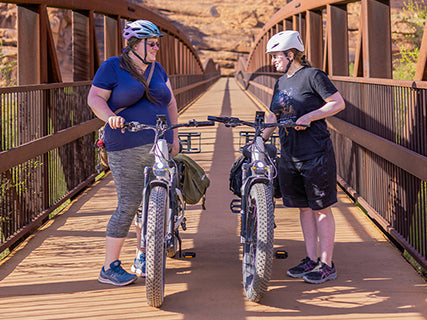What Are Mechanical Bikes?
Mechanical bikes rely on a steel cable to actuate the brake, which compresses the brake pad against the wheel when the lever is pressed. An important contract feature is the absence of fluid in mechanical bikes. Mechanical bikes work with standard rim brake shifters. Mechanical disc brakes are less expensive and require less maintenance.
Mechanical Disc Brakes vs Hydraulic Disc Brakes
Disc brakes are becoming increasingly popular due to their benefits and characteristics. Modern bikes are generally equipped with disc brakes rather than traditional rim brakes. To meet the rider's fast and adventurous riding requirements, modern and expensive disc brakes are a better alternative for road bikes.
When we compare the working mechanisms of mechanical and hydraulic disc brakes, we can observe that mechanical disc brakes use a cable-pulling mechanism to transfer braking power, but hydraulic disc brakes use fluid.
Because mechanical disc brakes employ the same cables and levers, replacement parts are easy to get all over the world. Furthermore, these disc brakes may be repaired using simple tools. Furthermore, fixing these disc brakes is not a difficult operation.
Because there is less friction in the system, hydraulic disc brakes work smoothly for a long time. A user can ride quickly because of good operating qualities, such as quick stopping. However, spare parts for hydraulic bikes are hard to find everywhere. The service task is a tough one because it requires special tools to perform.
Efficiency difference
In terms of efficiency, mechanical brakes never match hydraulic brakes, especially when wet. Mechanical disc brakes are unable to compete with hydraulic systems in terms of efficiency. Mechanical disc brakes are nevertheless subject to cable friction, which means that the force exerted at the lever will be larger than the resultant force at the caliper.
Hydraulic brakes that have fluid in the master cylinder deliver a quality braking mechanism to the expected level. The efficient braking mechanism of hydraulic brakes presses the brake pads together when pulling the lever.
Mechanical brakes surpass rim brakes but lack the benefit of lower brake friction that hydraulic brakes provide.
Hydraulic brakes decrease friction and provide more consistent and reactive braking. It is comfortable or handy when traveling downhill, whether it rains or at high speed.
Yet another major difference is that the hydraulic brake systems increase the level of force applied to the lever, so the braking force is greater than the force applied.
This is the primary explanation for the disparity in efficiency and performance. Hydraulic disc brakes provide significantly superior functionality while requiring so much less effort.
Maintenance difference
Hydraulic brakes are simple to maintain. The use of sealed fluid in hydraulic brakes prevents dirt from accumulating or getting inside, making the braking system maintenance free. The fundamental reason for this is the absence of a cable to extend and modify. The main thing you'll have to do is frequently change the brake pads when they wear out. Moreover, air and water-tight hydraulic brakes do not rust or corrode. These reasons enhance a user's experience of off-road riding and mountain biking.
Mechanical brakes may let dirt into the system, reducing performance significantly. Hence, mechanized disc brakes require regular maintenance and repair. The brakes get out of alignment as the pads degrade and the wires lengthen. To keep them working properly, you'll have to make minor adjustments every couple of thousand miles. Fixing mechanical disc brakes may be time-consuming. If they aren't ideal, they will rub, which is both irritating and unproductive.
Design difference
Mechanical disc brakes are easier to design than hydraulic bike brakes, making maintenance quicker, cheaper, and far less irritating. Add to that the fact that repair parts for mechanical disc brakes are easily available, independent of the bike rider's position, and the attraction grows even stronger. Mechanical disc brakes are readily maintained with basic equipment by bike professionals and sometimes even by people who believe in the DIY task.
Shifting the positioning of brake calipers has led to a shift in design because when rim brakes were necessary for a certain spot, today you find bigger tires and rim thicknesses. The disadvantage of disc brakes is that they necessitate a separate hub from regular rim brake wheels to be suitable with the rotor of the disc.
How to Choose Between Mechanical and Hydraulic Disc Brakes?
When choosing between mechanical and hydraulic disc brakes, pick hydraulic disc brakes due to their superior performance over mechanical brakes. The hydraulic disc brake's improved modulation and stopping power are significant advantages in your decision. Furthermore, the hydraulic brake's low wear and tear value increase its worth.
There is a significant performance difference between hydraulic and mechanical disc brakes. So, why would some people choose mechanical brakes instead of hydraulic disc brakes? The truth is the cost. Yes, mechanical disc brakes cost less. Hydraulics offers the best efficiency and are lightweight, more reactive, and more dependable, but they are also much more costly.
The increased total price of hydraulic brakes, as well as the bikes that come with them, is a significant aspect to consider when assessing everything.
Off-road riders who want to invest in better braking performance might go with hydraulic disc brakes. Casual cyclists and commuters can opt for mechanical disc brakes without a second thought.
Conclusion
This post will teach you the fundamental distinctions between mechanical disc brake bike and hydraulic disc brakes bike. The distinctions between the two disc brakes are thoroughly discussed, along with the reasons for your changes. You may decide on the type of disc brake you wish to use based on your needs and expectations.
In general, hydraulics is the most efficient since they perform markedly better than mechanical disc brakes. The disparities are mind-boggling to read and experience. Hydraulic disc brakes are the preferable solution across the globe for riders that ride in an area where components are easily available.
For individuals who plan to travel in rural areas where acquiring spare parts may be difficult or for people with a tight budget, the mechanical disc brake bike could be a preferable alternative.



Share:
How to Choose the Car Rack for E-Bike
Know About Airless Bike Tires